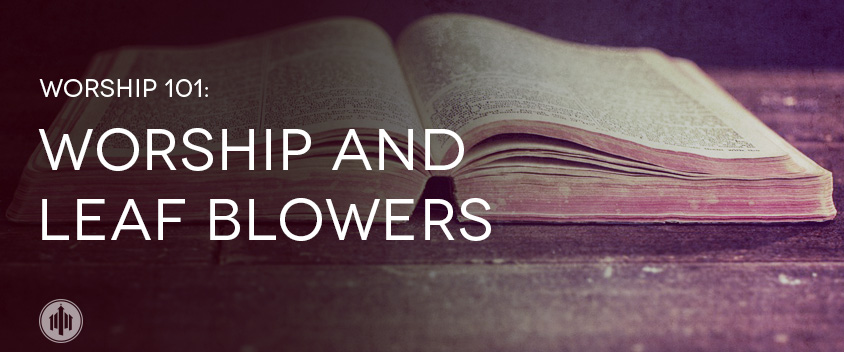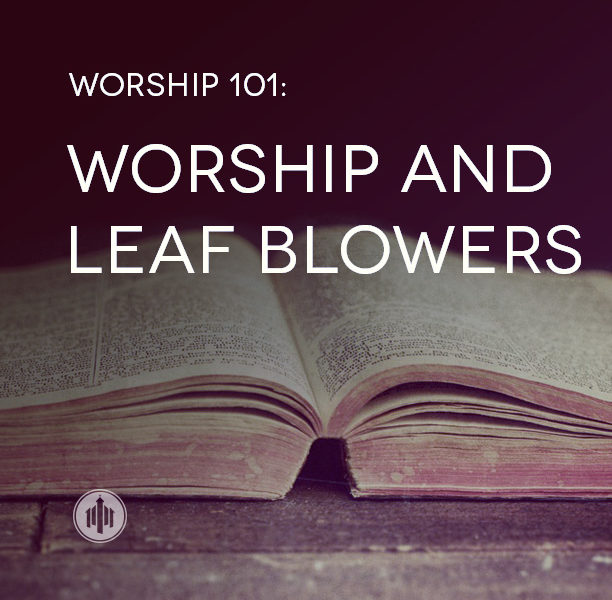
I have a love hate relationship with leaf blowers. Brooms don’t even hold a candle to the ferocious windstorm a leaf blower can conjure up; but they also have a dark side. The problem is that even when they are at an idle (finger off the… trigger?), a leaf blower is still (always) blowing. Walking around my yard, leaf blower in hand, I have to be careful where I point that thing. One mindless second and the dirt supposed to be chillin’ with the flowers has now gone rogue and is scattered across the patio. However, understanding that the blower is always “on” (as well as pointing and directing it correctly), the leaf blower performs marvelously at what it was meant to do.
Worship is no different. Worship happens all the time. Yes, there are those windstorm moments where we find ourselves intensely focused and singing our hearts out to God, but we worship even when we are at an “idle,” even when we don’t think its worship “time” and further still, even when we don’t think about what we are worshipping. Sometimes our worship, intended for the Creator of the universe, ends up pointing elsewhere. In life, we need to be careful where we direct our worship. The reality is, if it’s not at God, it’s being directed somewhere else.
Everyone worships something. You and I are made to worship (cue Chris Tomlin), not just in the “created with a purpose” sort of way (cue Rick Warren), but the “this is part of who we are and what makes us human” sort of way. We can’t help it. It is part of our fiber, part of our humanity. Our worship is always “on,” and we are all worshippers of something. Just because Christians gather on Sundays for a couple hours and call it “worship” doesn’t mean that that alone is worship. Worship happens before someone walks in a church, after they leave, and even if they never came at all.
So what is worship? Ask 10 worship leaders and you’ll probably get 10 different responses, maybe more. This isn’t a bad thing, it just shows that there are many facets to how each of us understand and describe “worship.” It’s like describing the Gospel. In seminary, I had a class where the professor asked each student to write down a one sentence definition of the Gospel. These were all people very familiar with God’s Word and the Gospel, but still, no two were the same. We all had slightly different ways of describing the Good News of Jesus Christ. Some spoke of love, some of prophecy, some of salvation, freedom, redemption, forgiveness, justification, ransom, punishment, penalty, God’s people, plan, purpose, Messiah, Son, etc.
With worship, a common pitfall is that we take a specific expression of worship and use that as our definition for all worship. Worship music is the obvious example. Churchgoers get so used to referring to the time of music and songs as “worship” that it gets stuffed into that little mold. Worship starts and ends when the song starts and ends. I sing, I worship; I stop singing, I stop worshipping, right?
Valiant attempts aside, I have avoided defining “worship” long enough. Here it is… my humble submission for defining worship… drum roll… love. Worship is love; or rather, an expression of love. Kinda feels like I just exchanged one vague word for another though, doesn’t it? Perhaps. But I would argue that if you really look at the heart of what it means to worship and you boil down any of the specific expressions of worship, what you end up with is and expression and response of love. That love can be lifting up the name of Jesus, kneeling before the LORD in prayer, declaring who God is, coming to the table in thankfulness, hands extended in praise, or opening God’s word. It’s important to note that the focus isn’t on the expression itself, it’s on who or what is being worshiped. That is what makes the expression itself loving, as well as worshipful. For example, I don’t sing worship songs because I simply love the act of singing, I sing because I love God. That singing is now an expression of worship, whereas if it were not for God, it would just be a song. There is a great lesson here: Don’t get caught up in loving love, get caught up in loving God. Sometimes we get infatuated by the feeling, the experience of worship, and we need to remind ourselves to keep our focus on who we are worshipping and not the act itself.
Worship, then, is the action between yourself and whatever you are worshipping; and that action stems from an attitude of love. In other words: there is you, there is something that you love, and there is the way you act/respond/express that love for that thing. What happens when you love something? It gets your attention. It fills your mind. It finds its way into the way you talk, what you think about, how you act, where you go and what you do. In the realm of the Christian faith, worship has everything to do with God being the object and focus of our worship. Naturally, our actions/responses/expressions of love towards God are worship of God. In this definition, “love” is clearly still the vague piece, but intentionally so, because it gives some wiggle room for the numerous ways we can express that “love.” Is spending time alone with God worship? Sure. You are showing God that you love him by spending time with him aren’t you? Is reading God’s Word worship? Sure. You are showing God that you love him by learning more about his story, commandments, and teachings. The list could go on and on. The point is not to identify all the specific expressions of worship, but to understand that love is the driving force behind them all, which is why I personally find it to be the most helpful way of defining worship.
The Great Commandment is that “You shall love the Lord your God with all your heart and with all your soul and with all your mind” (Mt 22:37). God’s Word describes how we should live our entire lives as worship to God (Isaiah 43:7, Rom 12:1). Our lives should be spent worshipping (loving) God. Our focus, hope, praise, thanksgiving, and adoration should be lavished upon God and God alone.
Getting back to the leaf blower, if we aren’t loving God, we are loving something else. Jesus spoke strongly about one of the great lures of his (and our) time: money. Jesus said that “No one can serve two masters, for either he will hate the one and love the other, or he will be devoted to the one and despise the other. You cannot serve God and money” (Mt. 6:24).
There is this amazing moment in Exodus 15 where God’s people, the Israelites, have just been rescued out of a life of slavery in Egypt. They stand on the other side of the Red Sea (which God just parted and allowed them to cross), and Moses leads them in this beautiful song of worship. They express their love to God for who he is, what he has done, and what he continues to do. What a wonderful expression of worship. What a great biblical perspective on how to respond to God’s love (demonstrated to them by freeing them from slavery in Egypt) by responding in love (worship) to God. As modern Christians, we similarly respond to God’s love (demonstrated to us by freeing us through Jesus Christ from slavery to sin) by responding in love (worship) to God. The heart of worship hasn’t changed much in several millennia.
Exodus also has an important warning for our worship. Not long after the Israelites were rescued out of Egypt, Moses was up on Mount Sinai getting the two stone tablets (yes, those tablets, the Ten Commandments and the Law that God had inscribed with his own finger). Intense stuff. Meanwhile, back down the mountain, apparently Moses was gone a bit longer than the people could handle. The Israelites lost their focus. The leaf blower strayed into the flower bed. The love for God that they had just sung about 17 chapters ago was no longer on their lips, and they were collectively melting down their bling to make a golden calf to worship, saying that these were the gods that brought them out of Egypt. Fast forward to the present. We’ve got all sorts of modern day golden calves out there. Only when we truly understand the magnitude and scope of worship can we recognize those places where we might be worshipping some of the wrong things and be brought to that place where we correctly worship God and God alone.
One of the beautiful characteristics of how God created us and this world is that we have a freedom to worship. We don’t have to worship Him. We can decide for ourselves what we think is deserving/worthy of our worship, praise, devotion, focus, and love. Scripture is filled with the declaration that God alone is the only one worthy of our worship, but we still have a choice, which makes loving God that much more meaningful. Like the way our salvation and assurance in Christ is based on a choice to respond to God’s love, so is our worshipful and loving response.



 The Collective Worship Setlist
The Collective Worship Setlist
Great article, Brandon. I appreciated your simple definition of worship–one word–“love.”
You have some great lines in this article that really resonate with me as a worship leader:
“Worship happens before someone walks in a church, after they leave, and even if they never came at all.”
“It’s important to note that the focus isn’t on the expression itself, it’s on who or what is being worshiped.”
“Sometimes we get infatuated by the feeling, the experience of worship, and we need to remind ourselves to keep our focus on who we are worshipping and not the act itself.”
“In other words: there is you, there is something that you love, and there is the way you act/respond/express that love for that thing.”
May we, as worship leaders, choose to worship God alone, and in doing so serve as an excellent example to the people we are leading!